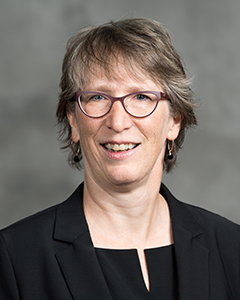Q&A with Ph.D. Program Director Ellen Smith
 The U-M School of Nursing Ph.D. program values and emphasizes a culture of trust, collaboration and care for its students, faculty and support staff. As you begin you process of evaluating schools that are the right fit for your doctoral training, we want you to have every opportunity to get to know the leaders who will be supporting you on a daily basis. Before you attend our live webinar, we encourage you to learn more about the U-M School of Nursing Ph.D. program through the words of its program leader, Ellen Lavoie Smith, Ph.D.
The U-M School of Nursing Ph.D. program values and emphasizes a culture of trust, collaboration and care for its students, faculty and support staff. As you begin you process of evaluating schools that are the right fit for your doctoral training, we want you to have every opportunity to get to know the leaders who will be supporting you on a daily basis. Before you attend our live webinar, we encourage you to learn more about the U-M School of Nursing Ph.D. program through the words of its program leader, Ellen Lavoie Smith, Ph.D.
How do you help students pursue their passion and the specific areas of nursing science they’re interested in?
Ellen Smith: That process starts right when students submit their admission application. Along with our faculty, I oversee the process to match students with the best mentor who has the expertise in the subject they want to learn about. That match is critical. We work hard to make sure we don’t push students into an area they’re not passionate about. In fact, we’ve turned down some great students because we just didn’t have the expertise to support what they wanted to study.
I frequently meet with students and mentors to stay engaged in that process. Sometimes there’s a need to expand to a multi-mentor system, so we help students find the content experts who can help them be successful. For example, I recently met with a student who really wants to work with lung cancer patients, so I helped her connect with an expert physician at Michigan Medicine.
How do you interact with students on a day-to-day basis?
ES: I often help students with a number of issues, from academic challenges to personal problems. If students are having difficulty progressing in the program, I help them work through that. I also help students navigate the various stages of the Ph.D. program. When students are preparing for their preliminary exams or dissertation defenses, I help them understand those processes, looking at things like the makeup of their dissertation committee and the timing they need to complete each step.
What are some things you would like prospective Ph.D. students to know?
ES: Know that we’re going to put a lot of time and effort into understanding what you want to study and matching you with the experts who can help you achieve your goals. Our program is highly individualized based on the area of science you are interested in.
In addition to a robust student support network, know that I am here to help you. I enjoy getting to know each student, and I’m able to do that because our program is smaller. This work is going to be challenging, so I work hard to be accessible and kind.
What are your primary responsibilities as the director of the Ph.D. program?
ES: I work with faculty to make sure we design and deliver courses, training and activities that allow students to meet the competencies required of a nurse scientist and become stewards of the nursing discipline. I advise students as a mentor and in other capacities, connecting them with professional networks, writing letters of recommendation, helping them find funding for their projects and much more.
How did you know you wanted to pursue a Ph.D. in nursing?
ES: I was a nurse practitioner working with cancer patients, and as I became more experienced I also became frustrated. There were so many of my patients’ needs I didn’t know how to address; so many questions I couldn’t answer.
I wanted to become a scientist so I could figure out a new treatment for these patients. As a clinical nurse, I was making an impact individually, but I wanted to do more than that. I wanted to learn new things and expand science in a way that would help populations of people.
What is the most rewarding part of your work with Ph.D. students at the U-M School of Nursing?
ES: I love watching students learn, grow and gain confidence. You can clearly see points along the way when their confidence builds, then they end up graduating, seizing these incredible opportunities and becoming their own scientists. Seeing students succeed and knowing you’ve been part of that … it’s my favorite thing.





